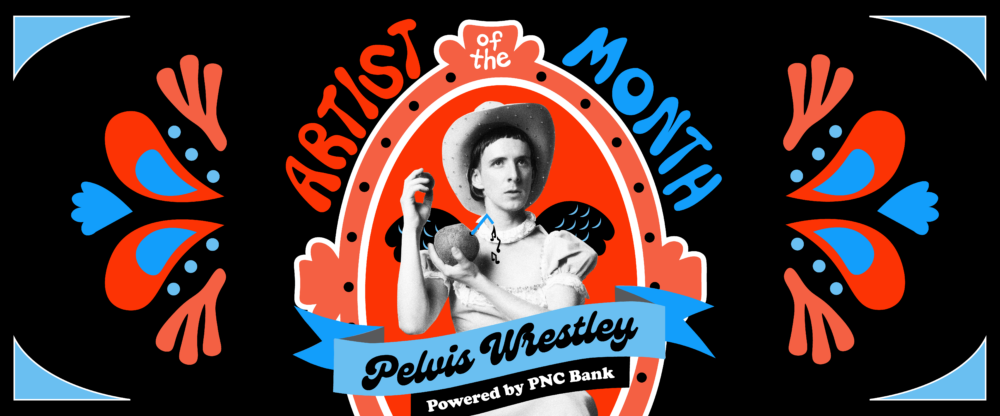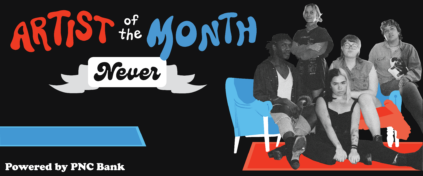by Jeff McCord
KUTX Artist of the Month is powered by PNC Bank
For Benjamin Violet, who fronts the Austin group Pelvis Wrestley, identity is everything. And they’re out to upend it.
Pelvis Wrestley has been a major draw almost since they began playing in 2018. Their brand of Americana is synth-y and muscular, and Violet, garbed in colorful cowboi gear, rivets your attention. That attention is likely to increase with the release of their debut album, Vortex Vorever.

Violet is not your typical country music star, and that’s precisely the point.
“I was in this very escapist, theatrical synth-pop group called ANDY when I moved (back) to Austin, and one of the collaborators in that group–my friend Lyndsay Dyk–was giving me my country education,” Violet explains. “That was in 2016, right around when the election was heating up. When Trump was elected, I felt all this dissonance around what it meant to be an American when it felt like I hated so much about what America was becoming. It simultaneously felt like America hated who I was, as a non-binary citizen. I was being told that being queer, being non-binary was being un-American.”
It’s easy to draw distinctions between today’s environment and the Austin that was. In the 70s, the counter-culture movement was in full swing, but having long hair was enough to get the crap beat out of you by the local rednecks. That is, until the hippies appropriated country music and harmony ensued.
Violet is a shrewd social observer who hasn’t missed the lessons of history.
“For the queer and trans community, embracing an American identity is as defiant as it is dangerous. Leaning into country music felt like an appropriate means for processing that conflict. Pelvis Wrestley is essentially anti-escapist, running right into the fray of cognitive dissonance. Country music’s association with American nationalism makes it a great medium for flipping that dissonance on its head. When I talk about country music, I’m talking about being American. When we play country music, we “queer” what country music is; and by extension, we “queer” what an American is.”

“By associating with these things, we change what they mean, even if only by degree. I can stand next to a MAGA extremist and have [an] equal claim to the American flag. His way of being American splashes over onto me by association, but my way of being an American also splashes over onto him. But only if I choose to associate with him. Cognitively, spiritually, I like thinking about how being in the same nationality as him makes him a little queer.”
Violet might be giving this more thought than most Pelvis Wrestley fans. Social agendas alone don’t pack clubs, at least not usually. PW is an irresistible mix of fun, kitsch, and affirmative songwriting. “Until love comes I’m going to keep on running,” Violet promises in their slow-building single, “Keep On Running”. It’s not just a catchy chorus, it’s a form of group therapy.
Pelvis Wrestley began with guitarist Santiago Dietche (Daphne Tunes) and drummer Sarah Schultz (Sun June), keyboardist Hannah McVay and has added Zack Wiggs (Brody Price) and Tommy Cook (Tombus) to what Violet terms ‘the call list’. Some combination of these busy musicians rock the house on any given night.
And Violet’s cowboy hat might be the only country music tipoff.
“I’m not committed to staying under the country music banner forever. I’ve never been great with staying in-genre in the first place, and most folks won’t even recognize the work we’ve done as country music. Pelvis Wrestley will always do work exploring how we are made up as people, and what negotiations we have to do with our identity markers in order to exist in polite society.”






